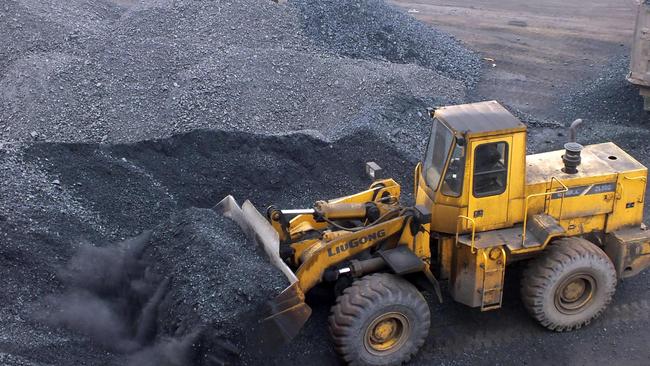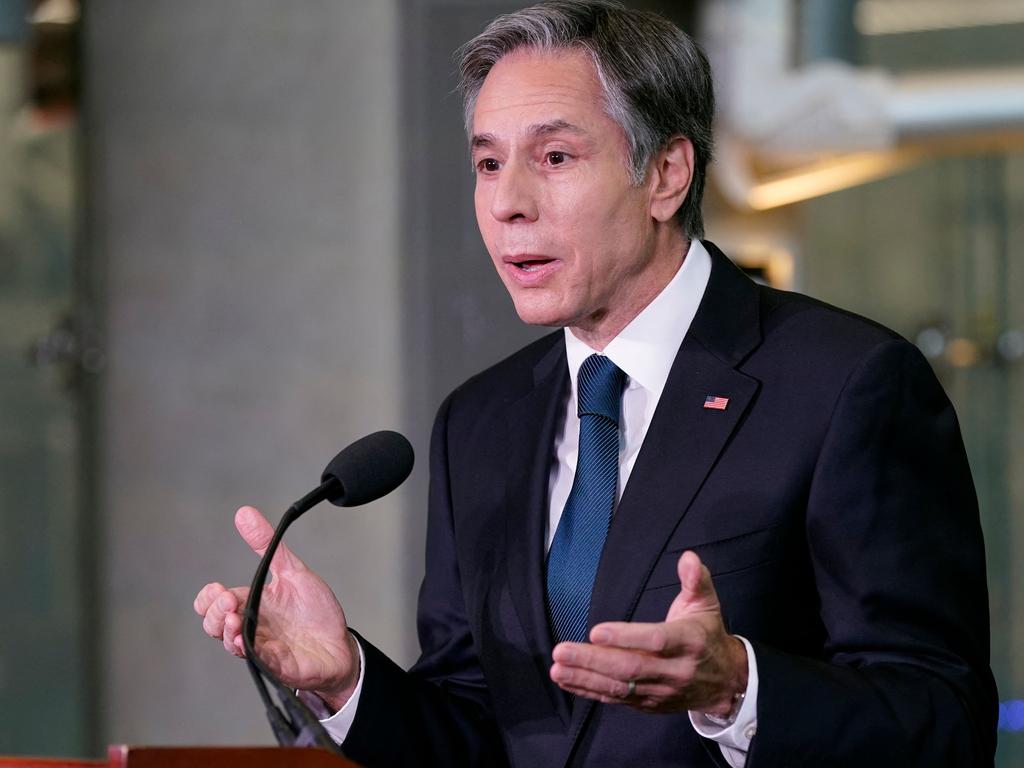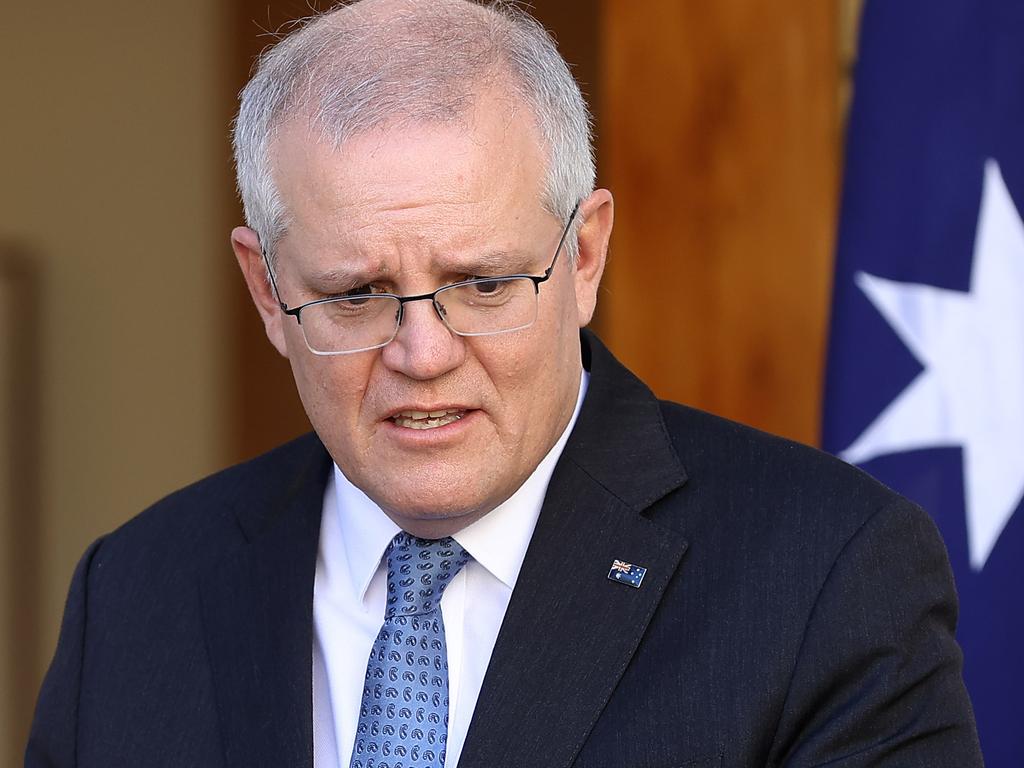
The immediate consequence is the European reaction to the latest Intergovernmental Panel on Climate Change report — this will merely harden the EU resolve for a carbon border tax to protect the EU from being disadvantaged by industry in nations with far laxer climate measures.
The EU’s ambition is to lead the world on climate action with its ambitious 55 per cent reduction levels at 2030 off the 1990 base. Its border tax is a momentous step, huge in principle, complex in detail, with economic and strategic ramifications. Australia believes this is a colossal blunder, European egoism at its worst. The Morrison government believes this will damage global trade, its impact on climate change will be marginal at best and it will divide the world.
On Tuesday Scott Morrison said Australia took the IPCC warnings seriously and Australia intended to be “part of the solution”. But, as the Prime Minister signalled, emissions are a developing world problem – they are about China and India. Imposing a carbon tax at EU borders won’t solve the problem at source. Yet much of the debate, he said, ignored the truth of the data.
Morrison seeks to play an extraordinary double game; he knows he must stick by the UN-sanctioned orthodoxy of targets and net-zero carbon emissions by 2050 as the universal benchmark. But his conviction lies in a technology-based solution that he sees as the only way China, India, Indonesia and developing nations can solve the global problem. When Morrison talks technology he finds developing world leaders are listening and agreeing.
Australia’s rejection of carbon taxes coincides with the rising tide of support for taxes and price mechanisms in Western elite opinion. Energy and Emissions Reduction Minister Angus Taylor said recently the EU proposal was a means to “see Europe forcing its internal standards and carbon tax on the rest of the world” and that under the cover of climate action “a new wave of protectionism threatens to sweep across the world”.
The truth is somewhat different because the trade protectionist wave has arrived. Its principal architect was Donald Trump. The emerging danger is that Joe Biden, the agent of Trump’s demise, is becoming the champion of his predecessor’s protectionist, America-first trade outlook, thereby crippling the US’s ability to provide economic leadership in Asia. That would be a devastating blow for Australia.
Forget China for a moment. Morrison’s global agenda has got two serious problems, with the EU and with the US. On display is how Europe’s climate protectionism and Biden’s political protectionism are cutting across the bigger strategic game plan where Australia hopes the rise of China can be matched and balanced.
The urgency about climate change will drive risky new policy. In his East Asian Forum report, Australian National University economist Shiro Armstrong said: “The commitment of the EU and other major industrial powers to similar carbon reduction targets will require an upheaval in established patterns in global production and international trade the like of which has not been witnessed since the industrial revolution.”
The EU border tax will have two results. First, it will drive a wedge between Europe and the Indo-Pacific. Resentment at Europe imposing its rich-world view of climate on others will spark regional resentment. The EU tax begins by targeting four carbon-intensive sectors – cement, steel, aluminium and fertiliser. These are sourced heavily from Asia-Pacific exporters and will constitute frontline targets.
Second, while the EU said its tax is consistent with the World Trade Organisation, this is sophistry. It is fatuous to think the European tax will not undermine further the liberal trade order on which Australia has depended for decades. That order is already battered beyond recognition by the US-China trade war, China’s resort to economic coercion against Australia and other countries, and progressives using trade to advance social and climate change goals.
Armstrong said the EU tax and other proposals threaten to sink the core principle of the liberal trade order – that you cannot discriminate between nations. He warns of a shift to a new paradigm, a world of “more economic conflict” where businesses “will need to tune both investments and production decisions to the values of the countries they wish to sell to”. Indeed, this is the revolution social and climate champions seek.
Trade Minister Dan Tehan has warned his counterparts that border taxes are counter-productive. But Australia must be careful because it needs Biden to honour his pledge that the US will stand by Australia in its trade coercion struggle with China.
Morrison is working with Nationals leader Barnaby Joyce to turn net zero by 2050 into a feasible position. As to what ultimately drives Morrison’s stance, it is not the threatened border tax but the far more potent drive by financial institutions to impose the net-zero criteria on their investment decisions. That’s what matters. That’s why Australia has no choice but net zero.
While Morrison welcomes Biden’s strategic stance against China, Australia knows there is a vacuum in Biden’s Asia policy: his attachment to Trump’s protectionism and his view that any US decision to join the revamped Trans-Pacific Partnership trade pact is a bridge too far.
This attitude is a gift to China. Unless Biden recognises that he must compete against China’s economic leadership in the region then the US’s strategic goals will fail. As Kevin Rudd says in his essay in Foreign Affairs, China takes heart from ongoing US protectionism and its inability to participate in the regional trade arrangements. This is Trump’s curse.
During his recent visit to the US, Tehan urged the Biden administration to shift on to the economic offensive in the region. Tehan has proposed that the US join Indo-Pacific nations in a proposed digital trade agreement also involving Japan, Singapore, New Zealand, South Korea and Canada.
Tehan said of the US and trade: “If we can take that first step then hopefully we could look at a second step” – and that second step would be, down the track, a historic change in the US policy to commit to the dynamic economic architecture of the region and enter the revamped TPP. Of course, the domestic political obstacles are immense.
As The Economist (July 17-23) said, the defect with Biden’s economic outlook on Asia is “it is unlikely to work”. The risk is that the US is playing China’s game with policies that shun free trade and enshrine subsidies, regulation, domestic protectionism and government intervention. Biden’s Asian adviser, Kurt Campbell, said the US needed a positive economic vision for the Indo-Pacific. That’s what Australia wants, yet fears the new age of protectionism will become an insuperable barrier.
You can hear the podcast of all Paul Kelly’s columns in the Podcasts section of The Australian’s app. App users can swipe to Podcasts and hit +Follow on Paul Kelly: Columns. Download the app via: Apple App Store | Google Play Store.








The rising climate change threat and Covid-induced demands for greater domestic security are going to change the world – these forces are irresistible and will pose extreme challenges for Australia in its dealings with Europe, the US and China.